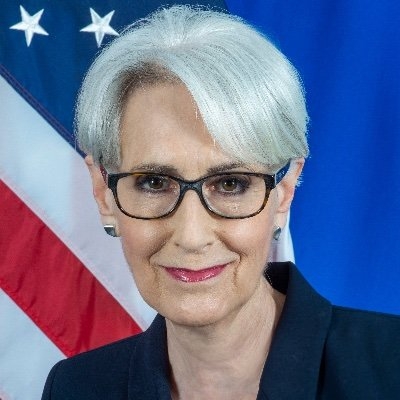![]() China is sharpening its claws before the big meeting between US President Joe Biden and Leader for Life Xi Jinping comes up late October this year. The US too is preparing itself to take on an unapologetic and aggressive China before the two leaders meet, most likely after the G20 meeting.
China is sharpening its claws before the big meeting between US President Joe Biden and Leader for Life Xi Jinping comes up late October this year. The US too is preparing itself to take on an unapologetic and aggressive China before the two leaders meet, most likely after the G20 meeting.
A glimpse of what is to come was visible today in the high-level, high-decibel talks between an avowed Communist State and a liberal democracy.
After talks with Japan, South Korea and Mongolia last week, US Deputy Secretary of State Wendy Sherman is in Beijing to hold face-to-face talks with Chinese Vice Foreign Minister Xie Feng amid bitter relations and a fast-changing global geo-political scene.
On Monday, China hit out at the US for "highly misguided mindset and dangerous policy" which has caused a stalemate in their relationship and asked it to change its policy towards China.
A statement by the Chinese Foreign Ministry said that the China-US relationship faces serious difficulties because the Americans perceive China as an "imagined enemy."
The statement added: "The hope may be that by demonising China, the US could somehow shift domestic public discontent over political, economic and social issues and blame China for its own structural problems. It seems that a whole-of-government and the whole-of-society campaign is being waged to bring China down".
Relations between the two nations have slid continuously since former American president and Biden's predecessor Donald Trump chided Beijing over unleashing the "China virus". China countered it by levying "racism" claims on Americans and tried to blame the US Army for the virus spread. Trump and Xi further got embroiled in a trade dispute. Though experts had predicted that Biden's victory would reduce tensions between the behemoths, the new US administration has largely carried on with Trump's policy on China.
The Chinese foreign ministry said: "The US keeps making an issue with China. It's as if the US side has nothing to talk about except about China. We urge the United States to change its highly misguided mindset and dangerous policy".
Upping the ante, Foreign Ministry spokesperson Zhao Lijian told the media that China has expressed its strong dissatisfaction with the US stance on Covid-19 origin tracing, Taiwan, Xinjiang, Hong Kong and the South China Sea.
China is not happy with the four-member Quad either. It has been voicing its resentment at India, USA, Japan and Australia coming together to ostensibly take it on in what it considers its own backyard.
The Sherman-Xie meeting happens when tensions are rife in the Indo-Pacific over border clashes with India, war cries over Taiwan, trade dispute with Australia and the violation of air and maritime boundaries of sovereign nations in the South China Sea. Some of these raise the spectre of disputes conflagrating beyond boundaries.
Other allegations and suspicions that have shrouded the talks include allegations by multiple Western nations of cyber hacks, espionage and human rights violations in Tibet, Hong Kong and Xinjiang. China has retaliated by putting sanctions on US officials and asked it to desist from helping Taiwan with its military might.
The US has been supporting various South-East Asian nations by holding right of passage exercises in the waters near China and even organising war games in the region. It has also mustered its European allies to come to the SCS to keep the vital shipping lanes open in the Indo-Pacific and to send a signal to the communist regime over bullying its smaller neighbours.
The Sherman-Xie meeting follows one between Chinese Foreign Minister Wang Yi and Secretary of State Antony Blinken in Alaska in March where the two sides realised they were poles apart in their view of the world.




















